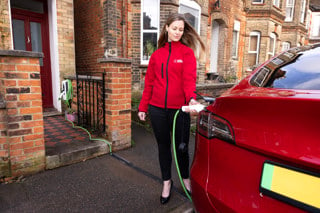A new research hub – the TransiT Hub – will use digital twins in determining how transport systems, from road and rail to air and maritime, can be decarbonised.
Led by Heriot-Watt University in Edinburgh and the University of Glasgow, the project is supported by a £46 million investment from the UKRI Engineering and Physical Sciences Research Council (EPSRC) and 67 partners, including Ocado, Tesco and Transport for London (TfL).
Digital twins or digital replicas of the physical world will collect data in real time by sensors connected to infrastructure such as roads, railways or shipping.
It will enable real-world data to be analysed to test and improve different scenarios, and the digital twin can then send back its solution for an improved process to the physical world in near real-time.
Researchers suggest that it could help motorists reduce carbon emissions, for example through updating digital road signs with information on the shortest route out of traffic jams.
It will also allow us to test how parts of a future decarbonised transport system work that does not even exist yet, for example electric road systems and alternative fuels.
By speeding up the way new systems are tested, it will help to identify the lowest-cost pathways to net zero carbon emissions, such as through helping logistics companies to identify the most sustainable routes, vehicle types and journey times.
Passengers and commuters will also benefit through being able to identify and help them make decisions about the most sustainable travel choices on a local, regional and national level.
Personalised digital twin assistants, operating similarly to how your Netflix account learns your preferences, could also build an understanding of mobility needs and journey requirements.
They could then offer near to real-time journey options based on individual needs and budget, as well as the reliability of transport services and how the impact of weather might change them.
Feryal Clark, minister for AI and Digital Government, said: “We see a technology future for British people which enriches and improves their lives. The research TransiT will now carry out is a prime example of how we’re supporting cutting-edge innovations to make that vision a reality.
“On top of saving the public time and money on the journeys they take day-to-day, this project will also harness the power of transformative digital technologies to cut carbon emissions – demonstrating the incredible impact technology can have in improving our public services, tackling climate change, and beyond.”
Transport minister Mike Kane added: “Digital twinning is a powerful technology that can help us integrate transport networks, improve efficiency and deliver greener transport for all.
“The launch of TransiT is an important step which will bring together academia, industry and government to research and realise the benefits of this technology for the transport sector. This is an excellent example of the work being done across government to deliver true innovation.”
Data to build the digital twins will come from TransiT’s industry partners, including the number and type of vehicles, fuel types, load sizes, length and frequency of routes.
The partners, who are providing £26m in support, come from across the digital, energy and transport sectors, including transport operators, regulators, vehicle makers, technology companies and energy suppliers.
The collaboration is thought to be one of the largest transport consortiums of its kind and the hub will also work with passenger groups so that transport users can help researchers to model human travel behaviour and choices.
TransiT will also provide a blueprint for how digital twins could allow other sectors to make transformational change, while allowing policymakers to study the consequences of decisions across a wide range of scenarios.
EPSRC executive chair Professor Charlotte Deane said: “Digital twins offer an enormous opportunity to decarbonise our transport networks by testing the potential impact of changes more quickly, reducing costs and helping us to design the transport networks we need, when we need them.
“Passengers and commuters will benefit through being able to choose the most sustainable travel choices, while transport operators will be able to speed up their work to provide low-carbon services.
“TransiT is the result of considerable work between UKRI and government to identify how we can best harness the expertise of a wide range of partners across academia, industry and other organisations to ensure that we seize the opportunities digital twins offer.”
TransiT joint director, Professor Phil Greening, of Heriot-Watt University, added: “Transport accounts for about a third of UK carbon emissions and, with global temperatures rapidly rising, we have run out of time to carry out real world transport trials and learn from them.
“So, if the UK is to meet its carbon reduction commitments, we have to do our experiments digitally. We need to design the future transport system and optimise the transition to it.
“Digital twins will help us see the where, what and how to decarbonise transport. We start by building individual models of real-world transport systems. These can then be connected together and linked to the real world to give a bigger picture of what our future decarbonised transport system might look like – and the lowest cost way of getting there.”






















Login to comment
Comments
No comments have been made yet.